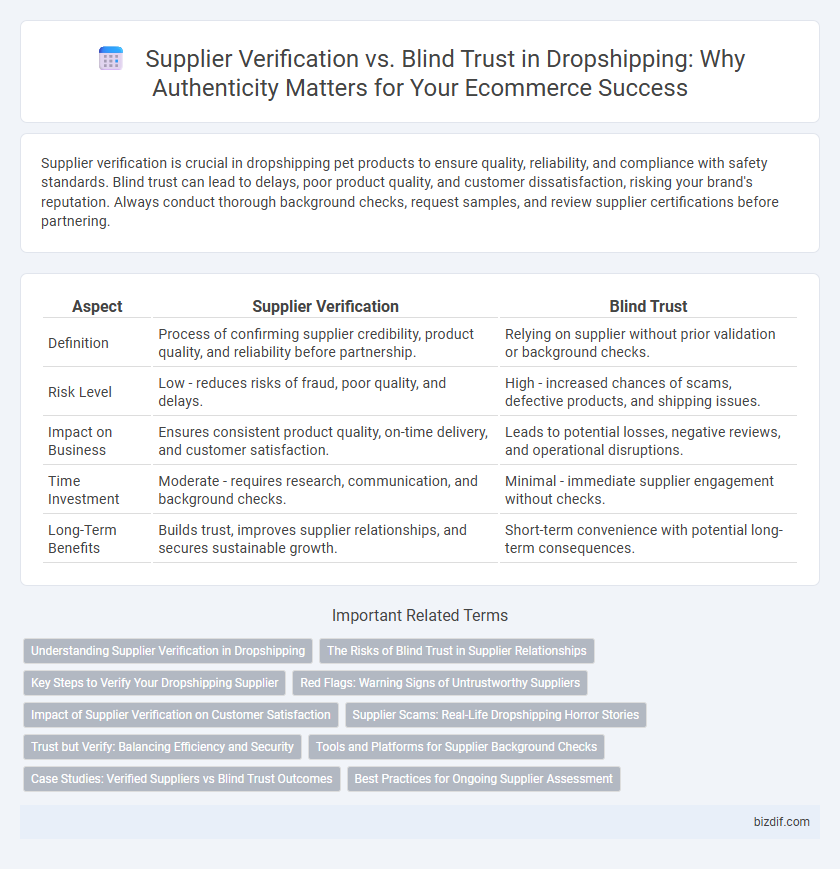Supplier verification is crucial in dropshipping pet products to ensure quality, reliability, and compliance with safety standards. Blind trust can lead to delays, poor product quality, and customer dissatisfaction, risking your brand's reputation. Always conduct thorough background checks, request samples, and review supplier certifications before partnering.
Table of Comparison
| Aspect | Supplier Verification | Blind Trust |
|---|---|---|
| Definition | Process of confirming supplier credibility, product quality, and reliability before partnership. | Relying on supplier without prior validation or background checks. |
| Risk Level | Low - reduces risks of fraud, poor quality, and delays. | High - increased chances of scams, defective products, and shipping issues. |
| Impact on Business | Ensures consistent product quality, on-time delivery, and customer satisfaction. | Leads to potential losses, negative reviews, and operational disruptions. |
| Time Investment | Moderate - requires research, communication, and background checks. | Minimal - immediate supplier engagement without checks. |
| Long-Term Benefits | Builds trust, improves supplier relationships, and secures sustainable growth. | Short-term convenience with potential long-term consequences. |
Understanding Supplier Verification in Dropshipping
Supplier verification in dropshipping involves thoroughly assessing potential suppliers through background checks, product quality tests, and reviewing business licenses to ensure reliability and minimize risks. Blind trust, by contrast, neglects these verification steps, often leading to issues like delayed shipping, poor product quality, and lost customers. Establishing a robust supplier verification process is crucial for maintaining product standards, protecting brand reputation, and ensuring consistent customer satisfaction in dropshipping businesses.
The Risks of Blind Trust in Supplier Relationships
Blind trust in dropshipping supplier relationships exposes businesses to significant risks including inconsistent product quality, delayed shipments, and potential fraud. Without supplier verification, retailers may face lost revenue, damaged brand reputation, and customer dissatisfaction due to unreliable order fulfillment. Conducting thorough supplier audits and requesting verified references can mitigate these risks and ensure a stable supply chain.
Key Steps to Verify Your Dropshipping Supplier
Verifying your dropshipping supplier involves critical steps such as checking business licenses, reviewing customer feedback, and requesting product samples to ensure quality and reliability. Confirming supplier contact information and payment terms reduces the risk of fraud and operational disruptions. Establishing transparent communication channels and conducting on-site visits when possible further solidify trust and partnership integrity.
Red Flags: Warning Signs of Untrustworthy Suppliers
Untrustworthy dropshipping suppliers often exhibit red flags such as inconsistent communication, delayed order fulfillment, and lack of verifiable business credentials. Fake or non-responsive contact information, poor or copied product reviews, and unclear refund or return policies further indicate unreliable partnerships. Verifying supplier legitimacy through background checks, requesting samples, and confirming online presence minimizes risks and protects your dropshipping business.
Impact of Supplier Verification on Customer Satisfaction
Supplier verification significantly enhances customer satisfaction by ensuring product quality, timely delivery, and reliable communication, which reduces the risk of returns and complaints. Verified suppliers provide transparency and accountability, fostering trust and repeat business in dropshipping operations. Blind trust often leads to inconsistent product experiences, damaging brand reputation and decreasing customer loyalty.
Supplier Scams: Real-Life Dropshipping Horror Stories
Supplier verification is crucial to avoid costly dropshipping scams, as trusting suppliers blindly can lead to delayed shipments, counterfeit products, and complete order failures. Real-life dropshipping horror stories often highlight merchants losing thousands of dollars due to fraudulent suppliers who disappear after receiving payment or deliver substandard goods. Implementing thorough background checks, reviewing supplier credentials, and requesting product samples significantly reduce the risk of falling victim to these scams.
Trust but Verify: Balancing Efficiency and Security
Supplier verification in dropshipping minimizes risks by confirming legitimacy, product quality, and delivery reliability, which safeguards business reputation and customer satisfaction. Blind trust can lead to issues such as counterfeit products, delayed shipments, and financial losses. Balancing efficiency and security through thorough supplier audits, reviews, and sample orders ensures a trustworthy supply chain while maintaining operational speed.
Tools and Platforms for Supplier Background Checks
Supplier verification in dropshipping relies heavily on robust tools and platforms such as Alibaba's Supplier Verification, Worldwide Brands, and SaleHoo, which provide detailed backgrounds and certifications to ensure credibility. Blind trust in dropshipping increases the risk of scams, delayed shipments, and poor product quality without the use of these verification services. Utilizing dedicated platforms for supplier background checks improves reliability, safeguards customer satisfaction, and enhances overall business reputation.
Case Studies: Verified Suppliers vs Blind Trust Outcomes
Case studies reveal that e-commerce businesses working with verified suppliers experience 30% fewer order errors and 25% faster shipping times compared to those relying on blind trust. Verified suppliers typically provide trackable shipments, authentic product sourcing, and clear communication channels, reducing customer complaints by up to 40%. In contrast, dropshipping ventures trusting unverified suppliers face higher risks of counterfeit products, delayed deliveries, and increased refund rates, leading to lower overall customer satisfaction.
Best Practices for Ongoing Supplier Assessment
Regular supplier verification enhances dropshipping success by minimizing risks related to product quality, shipping delays, and compliance issues. Implementing continuous assessments through order tracking, customer feedback analysis, and performance audits ensures reliable supplier partnerships. Maintaining transparent communication and verifying certifications uphold standards that prevent costly disruptions in the supply chain.
Supplier Verification vs Blind Trust Infographic

 bizdif.com
bizdif.com